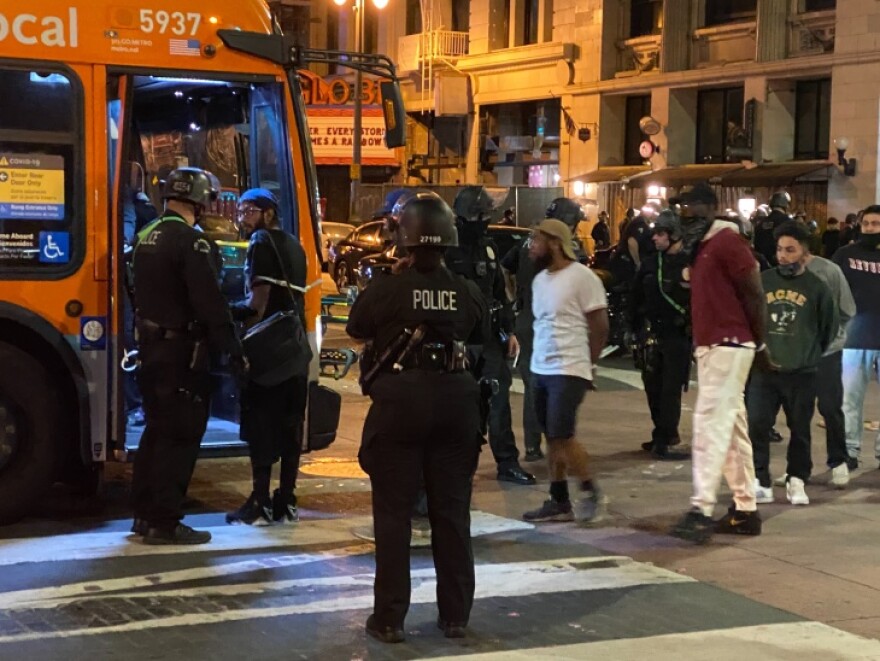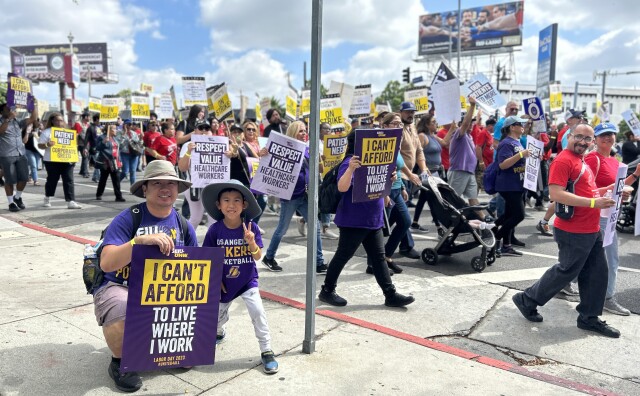Why Are LA Metro Buses Taking People Arrested In Protests To Jail?

On Saturday, as peaceful protests against systemic racism and police brutality gave way to opportunistic chaos, Los Angeles County's public transit system did something one official later described as "unprecedented": it completely shut down service.
Metro CEO Phillip Washington issued a statement Saturday evening, initially saying bus and rail service would be suspended "in the affected protest areas," which included downtown Los Angeles and parts of the Westside.
But at 8 p.m., the agency announced all its system was shutting down countywide, citing the curfews in effect in several local cities. Metro officials later said some buses had resumed service to pick up stranded riders.
During the chaos of the 1992 L.A. Riots, the agency that proceeded Metro did suspend routes in and around South L.A., but there was no systemwide suspension.
Many people were understandably upset, and let that be known on Twitter.
sincerely, how can you simultaneously tell people they’re required by law to go home and then also shut down the system they need to get home
— Josh Fruhlinger (@jfruh) May 31, 2020
The agency apologized to riders Sunday, saying the decision was made "out of utmost concern for the public and our employees during the growing severity of this protest." Metro also said it will fully reimburse stranded riders (with a verifiable receipt) who had to take ride-share or taxi services instead.
'This Was A Huge Mistake'
Leimert Park resident Brian Bowens takes public transit daily and said while he was able to get home Saturday before service was suspended, he heard from others who weren't so lucky. Bowens is chair of Metro's Citizens Advisory Council, though he spoke with me from the perspective of a faithful Metro rider and Angeleno.
"That system shutdown on the fly — that's a call," he said. "I can see where that mistake, where that overreaction... just kind of spiraled out of control... it's a panic reaction; I can give a lot of understanding to that situation."
But what's "absolutely disappointing" Bowens said, is that Metro buses are also being used to transport people arrested by police during the ongoing protests.
"I am sure LAPD has a dozen-and-a-half friggin' riot contingency plans," he said. "The massive amount of budget we waste on these cops and they can't use their own ****ing buses?!"
LAist / KPCC reporter Frank Stolze documented this Saturday night, as a line of people with their hands zip-tied behind them were led onto a Metro bus.
Buses, driven by Metro employees, also transported arrestees Monday and Tuesday, according to agency officials. The people arrested Saturday were taken to the LAPD's Metropolitan Detention Center near City Hall, according to Metro spokesperson Dave Sotero, and each bus had an LAPD escort. Eight buses were used Saturday, four were used Monday, and three were used Tuesday, he said.
LAPD officials did not respond to requests for comment and additional information.

On Monday, Metro officials said it was "an unfortunate and unintentional coincidence" that service was suspended at the same time LAPD requested Metro buses be used to take detainees to jail.
They cited a statewide "mutual aid" agreement, which requires public agencies to make their resources available "to prevent and combat the effect of disasters which may result from such calamities as flood, fire, earthquake, pestilence, war, sabotage, and riot" -- in this case buses requested by the LAPD.
Sotero told LAist it's "not Metro's choice or preference to provide these buses," but because of the State of Emergency issued by Gov. Gavin Newsom Saturday, the agency was compelled to fulfill the request from LAPD.
"Had we refused to supply this small number of buses, we could have come under even greater scrutiny and criticism, possibly from the State of California, for refusing to help in a time of great public crisis in Los Angeles," he said.
But for Bowens, the civil unrest that's spread in L.A. and across the nation isn't the type of crisis that requires public buses to become paddy wagons.
"[If] we had a major earthquake? Yeah, you're transporting citizens to hospitals. [If] there's been a terrorist attack, we need to use these buses to get people out of the affected area... that's mutual aid," he said. "I want to be very assured that Metro realizes this was a huge mistake."
Los Angeles wasn't the only city that suspended transit service in recent days. But bus operators in several other U.S. cities, backed by their labor unions, refused to transport people detained by law enforcement.
Sotero cited state law, which deems all public employees "disaster service workers" in times of emergency. Local union representatives for L.A. Metro bus and rail operators did not respond to requests for comment.
'Insult To Injury'
Images and videos of arrestees boarding buses led to another wave of Metro backlash. That included from L.A. City Councilmember Mike Bonin, who's also on Metro's board of directors. As news spread that Metro buses were being loaded with people detained in Saturday night's protests, Bonin said he would look into it.
"A transit agency should not be stranding passengers, period," he said on Twitter, "and especially during a god-damn pandemic, during a curfew, to transport detainees."
Bonin later told me it seemed "particularly off to shut down service for essential workers" and then provide service for law enforcement when many of the people arrested were being cited for non-violent curfew violations.
"It strikes people as just sort of the wrong use of resources and that's what we need to be talking about," he said.
Bonin said he reached out to Metro's CEO shortly after the service suspension was announced to share his disapproval. While he considers himself "one of [Washington's] biggest fans on the board," he explained why he feels it was a bad decision that added "insult to injury" for many of the agency's riders:
"...there were people who were stranded in a curfew in the middle of a pandemic. And that's just bad — that's bad on its face. It's worse in the middle of an uprising and a protest that is based on injustice against people of color, because most of the passengers on Metro are people of color."
The L.A. Metro system primarily serves Latino and Black residents, who make up over 80% of bus riders and more than 60% of rail riders, according to the agency's latest survey.
MORE ON LA PROTESTS
- The False Dichotomy Of Protest Coverage So Far
- What Happens After George Floyd? California Leaders Are Considering Reparations
- LA Civil Rights Leader On Police Brutality, Protests: We're In The Last Battles Of The Civil War
- KPCC/LAist Reporters Tear-Gassed, Shot With Rubber Bullet
- Black Lives Matter-LA Leader Explains 'Very Deliberate' Choice To Demonstrate In Upscale Neighborhoods
- LA Councilman Mike Bonin: 'We Need To Pay Attention To The Violence Of Systemic Racism'
- These Recent Events Are A LOT -- Tell Us Your Story Or Ask A Question
- Mis Ángeles: George Floyd Should Be Home With His Family Right Now
- George Floyd's Death Is One Of Many Reasons Activists Are Pushing For A 'People's Budget' In LA
-
The project will rename most of the terminals and all of the gates with the goal of world-class signage that leans into psychology.
-
After San Gabriel's city council rejected the proposal as "too narrow", one city councilmember argued the entire DEI commission, created in the aftermath of George Floyd's murder, had "run its course."
-
A medical industry challenge to a $25 minimum wage ordinance in one Southern California city suggests health workers statewide could face layoffs and reductions in hours and benefits under a state law set to begin phasing in in June. Some experts are skeptical, however, that it will have such effects.
-
Sandhill cranes are returning to the Lake Tahoe basin after a century long hiatus in what many say is a conservation success story.
-
The Dodgers fired Mizuhara in March after Ohtani's lawyers accused him of stealing millions of dollars from the baseball player to place bets with an Orange County-based bookie.
-
Jackie’s partner, Shadow, refuses to abandon their unviable eggs, despite her attempts to nudge him along.






